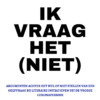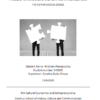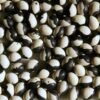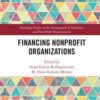
Crowdfunding artists: Beyond match-making on platforms
This article analyzes the role that crowdfunding plays for artists who create small-scale projects. We find that artists struggle to reach new audiences and, thus, mainly use this funding tool to transform monetary gifts into reputation for their careers. Crowdfunding platforms are believed to lower transaction costs while allowing for more direct engagement between founders…
Lees meer
Scriptie: Ik vraag het (niet)
Argumenten achter het wel of niet stellen van een geefvraag bij literaire initiatieven uit de vroege coronaperiode. Het coronavirus zorgde ervoor dat literaire makers en andere spelers in het literaire veld inkomsten verloren. Sommige makers en literaire initiatieven kozen er daarom voor om zich tot het mecenaat te wenden. Deze scriptie onderzoekt welke argumenten de makers…
Lees meer
Scriptie: Like, subscribe, and join us on Patreon
In deze scriptie heb ik onderzoek gedaan naar de manier waarop makers die content creëren voor YouTube hun inkomen aanvullen, of hun volledige inkomen halen uit crowdfunding, via het crowdfundings platform Patreon. Dit platform is opgericht om makers, van muzikanten tot documentaire kanalen, de mogelijkheid te geven om een maandelijks inkomen te verwerven door hun publiek…
Lees meer
Scriptie: De symbolische bankier
This thesis was written with the aim of mapping out the functioning of the Cultuurfonds donor circles. While previous studies focus on the patronage relationships between donors and artists, this research focuses on collective patronage and the mediating role of the Cultuurfonds. The results of this research show that the Cultuurfonds fulfils various mediating roles, including…
Lees meer
Hoogleraar mecenaatstudies Helleke van den Braber: ‘Makers en gevers moeten in de benen komen’
Hoogleraar mecenaatstudies Helleke van den Braber weet alles over de relatie tussen kunstenaars en gevers. Die wringt weleens. Want wat als een filantroop zelf wil drummen in de band die hij met zijn geld overeind helpt?
Lees meer
Crowdfunding the Queer Museum: A Polycentric Identity Quarrel
This case study illustrates how identities can be conceived as knowledge commons and how they can develop and be mobilized in situations of public contestation. The chapter uses the case of an art exhibition project carried out during 2018 in Brazil that portrayed a large number of queer- and LGBT- related visual artworks from Latin…
Lees meer
Lots of people give me money: Towards a comprehensive understanding of social information effects on donation behavior
How effective is sharing information with potential donors about previous donors’ donation amounts (that is social information) in affecting the donation behavior? Social information informs individuals about the behavior of others which can be used to increase individual donation amounts. If social information increases donations, why is that? In which situations is the effect of…
Lees meer
Scriptie: Matched Crowdfunding as an Alternative Fundraising Tool for the Cultural Sector
The aim of this research is to explore the potential of matched crowdfunding as an effective alternative fundraising tool for the cultural sector. In the light of the severe budget cuts of public funds for the cultural sector, along with the reduced funds and grants from foundations and companies, the necessity of alternative fundraising tools…
Lees meer
Follow the crowd: Social information and crowdfunding donations in a large field experiment
Purposely guiding human decision making with a discrete suggestion, ‘nudging’, is increasingly popular. One particularly promising nudge is to provide decision makers with information about the decisions of others, also referred to as social information. Social information is often applied in fundraising campaigns to increase individual donations. A discrete suggestion such as the donation amount…
Lees meer
Crowding-out or crowding-in: The dynamics of different revenue streams
An important question in public economics is to what extent changes in government funding lead to changes in private donations. In this chapter we identify and summarize four theoretical perspectives answering this question: the micro-economic, institutional-political, institutional signaling, and organizational perspective. Reviewing the empirical support for each perspective, we find that none of the perspectives…
Lees meer
